
How popular is the popular press?
What is the popular press for? Does it even exist now? We barely use the term anymore, tending to talk instead about “the tabloids”. Which is strange, given that everyone except the Telegraphs and the Sunday Times is now a tabloid, or at least compact. So, given that the term no longer denotes difference, why not revert to one that does?
Do we perhaps think that “redtops” works as a replacement, so that the Sun, Mirror and Star are lumped together in one class as the pops, while the Mail, Express and i are “middle market”. But where does that leave the blue-topped Metro?
Or should it refer to sales? In which case, the Mail should definitely be classed as a pop, since it’s the best-seller. And anyway, wouldn’t it be perverse not to include the Mail and Express in the “popular press”, given that they were the originals?
So much for semantics. Let’s lump all seven together and go back to my original question: what is the popular press for? Is it there to entertain? To interest and engage the reader? To put complicated but important matters into plain English? All of the above, but is it there to lead or to follow what readers think?
I’ve been musing on this because, as we approach year’s end, it’s time to take stock of what the papers have been focusing on over the past twelve months. And the thing that’s striking is how political the two big whitetops’ front pages have become. Not just in 2023. This isn’t a phenomenon that has appeared out of nowhere. It’s been developing for years – and was certainly apparent in the run-up to the Brexit referendum. And they’ve both been Conservative forever. Nothing wrong with that; the Mirror has been Labour forever. But while the Mirror shouts and rails about injustice and frequently takes the Government to task, it does still draw its subject matter from a bigger basket. The Express and, to a slightly lesser extent, the Mail now put politics front and centre, day after day, leavened only by a picture of a famous woman or a royal - preferably someone who fits both criteria.
Is that what readers want? Or have those papers given up on print as an actual product that people might want to buy? My suspicion is that they have. The websites are what matter in terms of reaching readers. The printed front pages are there as a tool, to influence not to inform, to be read out in the TV paper reviews last thing at night and on the Today programme first thing in the morning. They are talking to and for the politicians, acting as self-appointed go-betweens, purporting to know both what is good for the reader and to speak for them unto power.
Of course, it is the job of a newspaper to convey information from those in authority and to reflect readers’ concerns, but there needs to be explanation, interpretation, context, questioning, and that seems lacking. Rishi says this, Suella says that, Boris says the other. It’s all presented as gospel. Those strident “Get a grip!” “Save our pensions!” headlines are not articulating what the reader is actually thinking, but what the paper thinks the reader is or should be thinking (always accepting that sometimes they may very well be right).
Yes, we all want our benefits protected, our taxes cut, but these things don’t happen in a vacuum. We also want hospitals to treat us quickly, councils to sweep our roads and collect our rubbish. The papers that are most vociferous in demanding lower taxes are also those that denounce falling public services and potholed roads as though there were an endless supply of “waste” and “dead wood” and “red tape” that could be cut to make everything smoother and more efficient.
A rough-and-ready audit of the four big tabloids’ splash subject matter over the past year shows the Express has by far the narrowest perspective. Politics and economics have accounted for 120 lead stories – and that’s not counting migration, which provided a further 55. If you add in a further 28 about strikes and protests and another 9 about the health service, that means about two-thirds of a “popular” paper’s front pages have been devoted to political material. Royals, crime and world affairs shared another 77 almost evenly, leaving precious few pages for human interest, the quirky, or any other subject under the sun – the very things that should surely be the staples of the popular press. There may have been plenty of this inside – but it’s the front pages that demonstrate what matters to the publisher, if not necessarily the reader.

The Mail has matched the Express for Westminster-based politics – 90 against its rival’s 89 – and on strikes and protests (32), but had only half as many stories about migration.
It made up for that with 21 on general wokery. After taking out the other “heavy” stuff – crime, foreign affairs, banking, the NHS and the like – there were still more than a hundred pages to play with, of which the royals commandeered 36. And here we see that the Mail is more open to other subjects, such as spies and AI; more human interest, more society issues.
But it’s always so cross. Even the puffs are cross more often than not. Which is why, I suppose, that we get those faux-familiar and tortured pun headlines and captions on the token women – to lighten the package. Like “It’s posh and pecs, guess who’s been pumping iron”, “Julia’s a pretty chilly woman in sub-zero London!” and this week’s “Rita shows some backbone at fashion awards”.

Moving to the two big redtops, the Sun has had the biggest cast list, in that it features lots of different people (although it has some stalwart favourites), while the Mirror is more eclectic in its choice of subject matter. The royals (57) and celebrity gossip (51) have accounted for 107 Sun splashes, with another 37 on the Schofield / Edwards / Brand sagas, 26 on TV stunts, reality shows, soap plots and cast comings and goings, and 30 on football and footballers. Twelve celebrity deaths made a grand total of 212, leaving 120 for the serious stuff, the quirky and “normal people” doing unusual things.
The Sun has been roughly in line with the Express and Mail with 24 foreign stories – they all went for the earthquake in Turkey and Syria, the Ukraine and Gaza wars, the Titanic sub and Trump’s travails. So far this year, the paper has led on “pure” political stories only eight times, with a similar number on migration and 13 on strikes, protests and wokeness, so there has been plenty of scope for traditional tabloid fare. But it’s all been pretty grim. The Sun has well and truly surrendered its cheeky chappie role to the Daily Star. Here, too, the leavening comes in the form of a photograph of a woman – in the Sun’s case, in a revealing outfit and on the left of the page rather than the right.
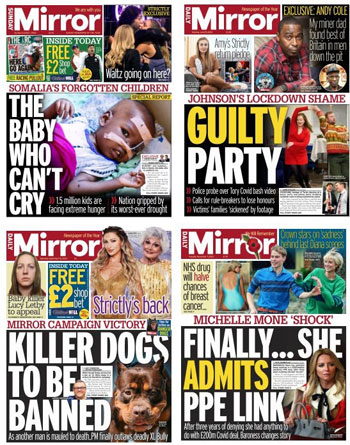
The Mirror is far less celeb-oriented and far more earnest. It has given readers 76 political splashes this year, including some excellent exclusives, not least the Conservative HQ Christmas party video, and has been dogged in its pursuit of Lady Mone over that PPE contract. If you add in strikes, the economy and immigration (just the seven of those), it rounds up to the century. The Mirror is just as keen as the rest on the royals – 31 lead stories – but much more interested in crime (45, including a lot of old lags that most readers won’t remember) and world affairs (37, including places like Somalia that no one else troubles with). It is also focused on dangerous dogs and heart-rending human interest stories, especially if they feature children. It is very good at finding real human beings to make its political points, although it is in danger of overplaying the “little girl’s letter to the PM” trick. All in all, taking into account its tally of 50 odd celeb / footballer leads and ten celebrity deaths, the Mirror seems the title that best upholds the tradition of a popular newspaper.
Gaza: waning interest?
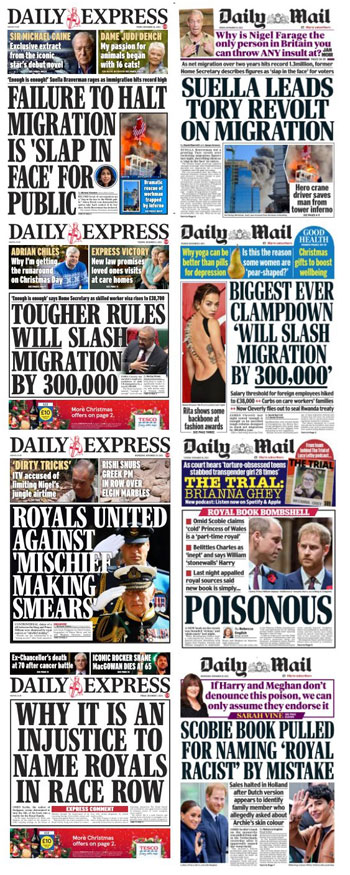
I was moved to ask that opening question by the way two stories have dominated the two whitetops over the past fortnight – immigration and the latest Harry bombshell book. You expect – or hope – that a “popular” paper would offer some variety, yet both the Express and Mail have retreated into their agendas, with 17 of their last 26 front pages leading on one of those two subjects (I have written more than enough on both, so will not trouble you with my thoughts on either today).
The Mail has also had a dig at the BBC, a pop at striking doctors, and speculation about tax thresholds being raised in the next budget. This last set of hopes and dreams coming just a couple of days after the Autumn Statement and including the phrase, “restore stability after Liz Truss’s disastrous mini-budget”. That, you might recall, was the one the Mail hailed as, “At last! A true Tory budget”. But what is more significant about the placing of this story is the fact that it came as others were reporting the release of the first hostages during a break in fighting after seven weeks of hell in the Middle East. A development that managed to secure the 12-13 spread, behind the frosty silence between Meghan and Kate, who “haven’t spoken for four years”, two pages on I’m a Celebrity and another two pages on the ownership of the Telegraph (a bit more on that later). The warring Windsors were, naturally, the front-page picture and the puff Jamie Oliver.
Has the Mail tired of the Middle East so quickly? Apparently not, for it did find space on its cover for a couple of marches – praise for the “no war cries, no angry chants” solidarity shown for the UK’s “fearful Jews” and opprobrium for “hardline” groups co-ordinating mass truancy so that “thousands skip school to go on Gaza marches”. These are both, obviously, domestic stories. The people in the warzone, even in their moment of freedom, no longer seem to warrant the Mail’s front-page attention.

The Express did, at least, make the first releases a substantial puff – but they still played second fiddle to Esther Rantzen saying she was surprised but pleased still to be alive. There was another puff the next day – hug of hope – but here the small boats threat to the Tories’ electoral prospects was deemed more important. The Express did, however, recognise the newsworthiness of the death of the youngest hostage, a ten-month-old boy who Hamas claimed had been killed along with his family in an Israeli air raid. How much faith anyone should put in that explanation is questionable; what is certain is that the photograph of a smiling baby will have affected every reader who saw it.

The Mirror splashed on the hostage releases on consecutive days; the Sun didn’t have them anywhere on their fronts. Meg and Harry, football and Helen in a black bra not liking her ex took precedence.

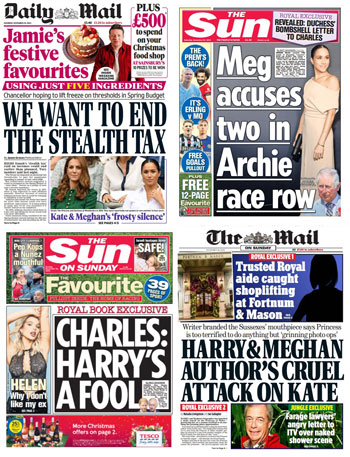
Over on the serious side of the street…
The Guardian and Observer led on Gaza on five consecutive days, making a total of seven over the fortnight. These covered the pause in the fighting to allow the release, the extensions to the truce, concern about disease, the renewed Israeli offensive and, yesterday, a UN warning that “apocalyptic” conditions are stopping aid getting through.
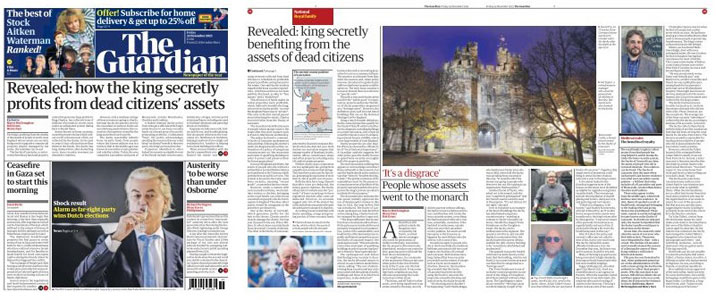
The Guardian also made a rare foray into matters royal, with an investigation into how the King “secretly profits from dead citizens’ assets”. Assets of people who die intestate and without heirs generally revert to the Treasury, but some go to the Duchy of Lancaster, whose profits go to the King, and some to the Duchy of Cornwall, whose profits go to the Prince of Wales. The Guardian reports that such money – the Duchy of Lancaster had collected more than £60m of “bona vacantia” funds over the past ten years – should be used for charitable purposes, but that it is being spent on repairing and upgrading properties, some of which are leased out commercially. These can then command higher rents, generating more income for the King. His spokesman told the paper that the bona vacantia money should not benefit the privy purse but be used to support local communities and preserve historic properties. There was more inside, with an explanation of how the system works, examples of properties owned by the Duchy, including Lancaster Castle, details of some of the people whose assets had become bona vacantia, and local people having their say. Unsurprisingly, they didn’t approve.
Whether this is a scandal – and, if it is, how great a one – probably depends on how royalist or republican you are. Some might say that if houses are being done up to make nicer homes for people to live in (the Guardian talks about boilers and double glazing) it’s no bad thing; landlords are more commonly under fire for neglecting rather than improving properties. But if the Duchy does regard bona vacantia funds as “free money”, as the Guardian reports, it is troubling. Either way, it is interesting and of public interest. Naturally, no one else followed it up.
The Times, meanwhile, led on the Gaza truce on four consecutive days, sandwiched between a clutch of migration stories (seven in total over the past fortnight, surpassing even the Express) and a couple on the covid inquiry.
As a broadsheet, the Telegraph is able to have its cake and eat it, so it had photographs of the freed hostages while focusing on domestic angles of the conflict: Comic Relief chief quits, Crackdown on charities that host extremists. This week, it has joined the royal book party, with two leads on the racism row amid its four migrant stories. It has also led on the TV licence, trans rights and its “Keir Starmer praises Thatcher” bombshell.
Apart from the latter, it’s a very Daily Mail-like approach. It has the same picture philosophy as well: Kate, of course, Anneka Rice, George and Amal Clooney. Should we now be regarding it as part of the “popular press”?
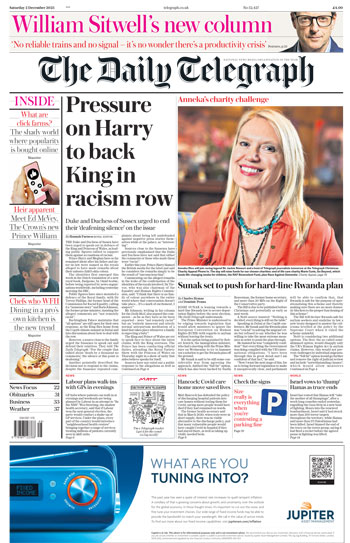
Foreign ownership of the press? Whatever next?
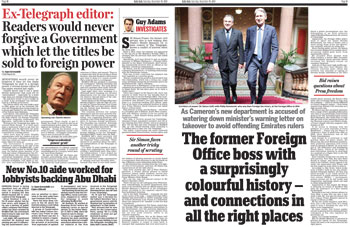
The Mail would, of course, dearly like to add the Telegraph to its stable. But it is back in the hands of the Barclay family – for now, at least – after its £1.2bn debt to Lloyds was repaid by Redbird IMI, which is in turn backed by Abu Dhabi. Last time we met, the Telegraph was reporting its future dispassionately. But now everyone is stirred up about the deal. Staff are “in open revolt”, columnists are railing against their possible new bosses. The Mail has undertaken a “special investigation” as part of a spread that majored on former Telegraph editor Charles Moore saying readers would never forgive a government that let the paper be sold to a foreign power.
The Times, too, is piling in, with stories first in business and then in the news pages. No one is happy about the proposed takeover. Recently, Jemimah Steinfeld of Index on Censorship wrote a column about the risks of the knight in shining armour becoming the poisoned chalice (an intriguing metamorphosis – wouldn’t he more likely be carrying the poisoned chalice?). She cites Vice, where articles about the treatment of LGBQT people in Saudi Arabia were spiked, and the National, where “a culture of fear” had developed in the newsroom (because there is no such thing in any newsroom in this country). But the most interesting thing about this piece was not the uncomfortable metaphor or the worrying examples of interference, it was the headline. “Foreign ownership of publishers brings cautionary tale”. I think the sub was having a laugh.
Chris who?
Typing “Redbird” into the search box of a cuttings service with a timeframe of the past fortnight produced 208 results among national newspapers. Stripping out the duplicates from the various editions brought the total down to 101.
Typing “Huhne” into the same search box of the same service with the same timeframe produced three results: two 500-word stories in the Times and Guardian and a shorter piece in the i. If you try “Catherine Tate” and ignore all the Doctor Who specials, you will find a small single on page 23 of the Express.
Last week, another batch of payments were made to a dozen celebrities who had taken News Group to court for hacking and illegal information gathering. They included a “substantial six-figure sum” to former LibDem cabinet minister Chris Huhne, who took the whole hacking scandal to a new level with claims that private investigators pursued him, not at the behest of reporters, news editors or editors but on the orders of executives, including Rebekah Brooks and James Murdoch. Their objective, he claimed, was to interfere with the business of government. NGN denies his allegations and it has to be said that his reputation has been forever tarnished after being jailed over a speeding ticket. But if the allegations were false, why did News pay him that “substantial six-figure sum”?
The company says Huhne could have carried on and taken the case to court. But that could have brought him to financial ruin. As News very well knows. It’s why it’s paying such vast sums – the latest estimate is something like £1.6bn since the scandal broke in 2011. It is desperate to keep the Sun’s name “clean”. And it’s why everyone’s eyes are on Prince Harry, who has not, so far, been deterred by the frightening financial ramifications of his determination to have his day in court, which will come next month.
There are two points here. The first is that investigative journalists and their employers – including News UK – get very hot under the collar about SLAPP cases, where hugely wealthy people start defamation cases to avoid public scrutiny. Quite right too. It is wrong that people should be able to use pots of money that ordinary people don’t have to prevent bad stuff they’re doing being revealed in the public interest. Which isn’t at all what NGN – and indeed the Mirror – are doing with those hacking victims.
The second is that if it is in the public interest to hear every spit and cough of what Meghan said about Kate and to scream blue murder about autocrats taking over one of our newspapers, isn’t it also in the public interest to report that a former cabinet minister (and a 7/7 victim and a Spice Girl and a couple of actors and a DJ among other celebrities) have been paid buckets of money by an organisation that insists it’s done nothing wrong.
This is what Huhne had to say: “Searching for political kompromat, spying on government ministers for commercial gain and knowingly telling repeated lies to maintain sales and ratings should all be utterly unacceptable in any responsible media organisation, yet are the stock in trade of the two Murdoch media companies.”
Strong stuff. And so was the denial: “Mr Huhne had the right to go to trial but chose to negotiate a financial settlement and to settle his legal action rather than have these allegations tested at trial. It is strongly denied that there was any corporate motive or direction to obtain information unlawfully. Huhne was a senior politician and stories published were legitimate and in the public interest.”
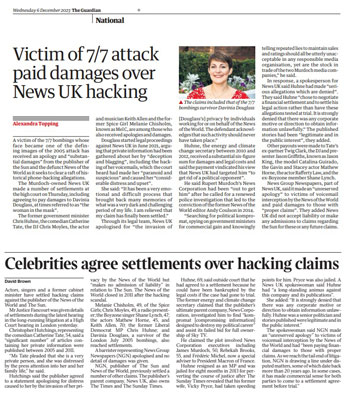
It really doesn’t matter which of those was right. What matters is that it should have been reported. The Guardian, as the standard bearer for the hacking investigations, did. And it was refreshing to see that the Times had the gumption and honour to do so as well.
Meanwhile, those papers most concerned about the press being shackled or gagged by some foreign autocracy – the Mail and the Telegraph – have gagged themselves and pretended it never happened. As indeed, did the Sun, Mirror and Express, whose owners are, coincidentally, all being sued by Prince Harry.
Front page of the fortnight
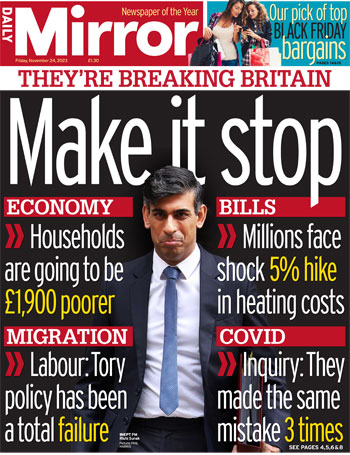
The Mirror was an early runner for this coveted title with this post-Budget cover. Until yesterday. The i’s format, with all that picture puffery round the edges, does not lend itself to the big poster pages that stand out from the newsstand. But this stark question, and the pictures of the people asking it, was a very arresting preview to Mr Johnson’s appearance before the Covid inquiry.
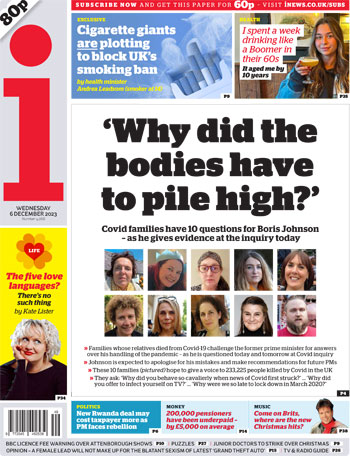
Winches from death
And a quick word of praise for the great minds that thought alike to produce this headline in the Metro and Sun. It was an astonishing story. And it was equally astonishing that it was nowhere to be seen in the Guardian. That’s a miss if ever there was one.
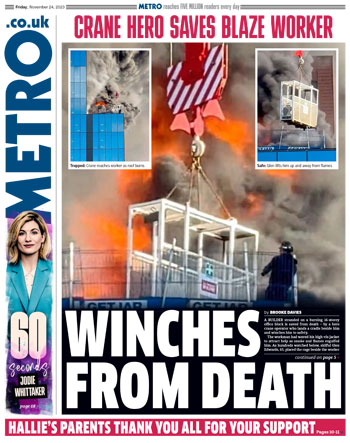
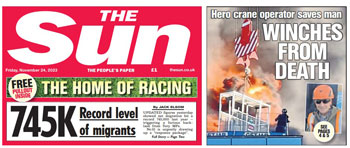
Liz Gerard’s Notebook is a fortnightly column published in the InPubWeekly newsletter. To be added to the mailing list, enter your email address here.












